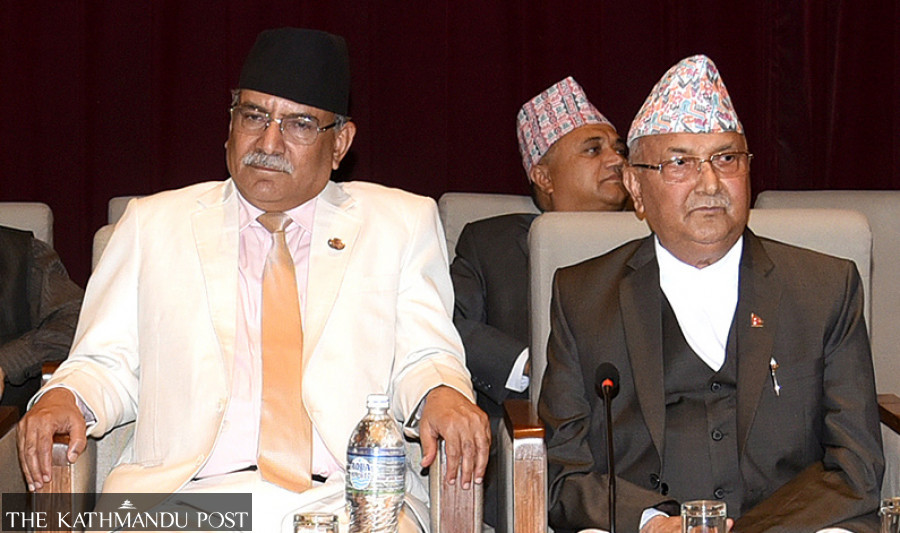National
Ruling UML, Maoists still poles apart on new President
At the heart of their disagreement is UML chair KP Sharma Oli’s insistence that he will not accept a consensus candidate for the March 9 presidential vote.
Tika R Pradhan
Differences between the major two coalition partners—the CPN-UML and the CPN (Maoist Centre)—resurfaced even at the meeting of the High-level Political Mechanism (HLPC) on Friday. At the heart of their disagreement is UML chair KP Sharma Oli’s insistence that he will not accept a consensus candidate for President.
The long-awaited meeting of the political mechanism led by Oli, the chairman of the largest party in the ruling coalition, ended inconclusively as the two parties continued to stick to their stands.
Three members of the seven-party ruling coalition—the Janata Samajbadi Party, the Nagarik Unmukti Party and the Janamat Party—skipped the meeting, hinting at a brewing crisis in the ruling coalition.
The gathering failed to make headway on Prime Minister Pushpa Kamal Dahal’s proposal for a consensus candidate for the presidential election slated for March 9.
“The two parties continued to stick to their guns on presidential elections during today’s meeting as well,” said Ramesh Malla, personal secretary of prime minister Dahal. “The Maoist Centre is in favour of a consensus candidate for President.”
Sources privy to the meeting said UML chair Oli had stressed the need for implementing the December 25 agreement, according to which the President and the Speaker would go to the UML while the prime minister’s chair went to the Maoist Centre.
First scheduled for Thursday afternoon, the HLPC meeting was postponed until Friday morning after the two top leaders of the coalition, Oli and Prime Minister Dahal, held a one-on-one.
Oli and Dahal have been meeting each other regularly to patch up differences over the presidential election as continued differences on this front, they fear, could even lead to the unravelling of the ruling coalition.
On Wednesday morning, Prime Minister Dahal reached Oli’s Balkot residence to discuss pending issues including the presidential election and the Rastriya Swatantra Party’s decision to pull out of the government.
At Friday’s meeting of the mechanism, its convener Oli proposed that the Rastriya Swatantra Party (RSP) be allowed to rejoin the government as per the December 25 agreement. However, the prime minister was non-committal as the CPN (Maoist Centre) has already decided not to give the Home portfolio to the RSP until the full text of the court ruling on Rabi Lamichhane, the party president, comes out.
The RSP had pulled out of the government on Sunday after the prime minister refused to give back the Home Ministry to his party. But the RSP has continued to support the government, saying its abrupt pull-out could create more instability for which the party would be blamed.
If the RSP decides to withdraw its support to the Dahal-led government, the ruling coalition will be on the brink of a collapse, in which case the prime minister could bring the Nepali Congress into his Cabinet.
With the Nagarik Unmukti Party’s refusal to give its vote of confidence to Rajendra Singh Rawal, UML’s chief minister in Sudurpaschim, the provincial government fell, and was quickly replaced by a Congress-led dispensation.
“We believe events in Sudurpaschim have taught the UML a lesson,” said a Maoist Centre leader. “We believe the party will now gradually soften its stand.”
During the party’s secretariat meeting held on Thursday, Chairman Oli said his party would make maximum effort to save the ruling coalition. According to leaders attending the meeting, Oli said the party would now wait for the next move of the Maoist Centre.
But Maoist Centre chair Dahal told his party’s central committee members at a virtual meeting on Thursday evening that the search was still on for a consensus candidate who can safeguard the constitution, which could not be said of the two previous Presidents.
“Even if the UML picks a presidential candidate, we want that candidate to be someone who can stay within constitutional bounds,” said a Maoist Centre Standing Committee member asking not to be named. “Our party has not said the candidate cannot be from a certain party.”
During the virtual meeting, Dahal had said the country’s recent past had given ample reasons (including the twin dissolutions of the federal house) to go for a consensus President.
“[Following the Congress’ vote of confidence], an environment of trust has been created. This gives us all the more reason to find a consensus candidate,” a Central Committee member quoted Dahal as saying in the meeting on Thursday.




 18.12°C Kathmandu
18.12°C Kathmandu














